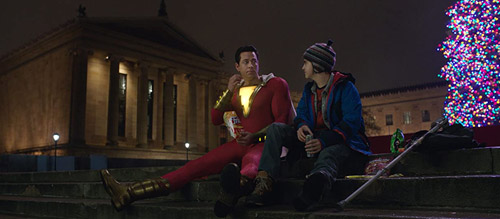DC’s Lightest Movie, Shazam!, Also Contains Its Darkest Moment
From its inception, the DC Extended Universe has defined itself by its darkness. While its Marvel competitor, after some early phase-one tonal flailing, quickly defined itself by the sensibility of Avengers director Joss Whedon – self-aware, zippy, ultimately optimistic, bubblegum with an MFA – the DC franchise set itself apart by allowing flagship director Zack Snyder free rein to explore all the underlit alleys and grimy basements of his imagination.
Snyder’s take on the characters stood in opposition not only to the sunny, Disney-friendly tone that had become the genre’s norm, but even to their own mythologies: his was a Superman who killed, a Batman who tortured and maimed. Man of Steel and its follow-up Batman v Superman tried to borrow the gravity of Christopher Nolan’s earlier iteration of DC films, minus any of the restraint. The stakes were always apocalyptic, with as much ultraviolence as a PG-13 rating would allow.
In spite of – or, perhaps, because of – all that sturm und drang, those early, Snyder-defined DC films feel emotionally hollow. The tragedy, gravitas and provocation they so desperately reach for feel more like poses than earned dramatic payoffs. Despite all the angsty wallpaper, they’re as alien and distant as their Superman. The single greatest gut-punch in the whole franchise would not come until later, well after Snyder had been unceremoniously and controversially sidelined, and would arrive in its most kid-friendly entry.
2019’s Shazam!, directed by David F. Sandberg, is the DC film with the lowest budget and the most peripheral character. With the least at stake, it was also free to express the most personality; even after the DCEU began to allow a bit more light and color post-Justice League, a mostly-comic, borderline children’s movie with an underage hero who initially sees his powers as an avenue to purchasing beer and lap dances still feels startlingly off-brand.
There’s genuine heart to the film, though, which bothers to ground its low-rent hijinks in real characters. If the Snyder-era films embody an adolescent notion of adult weightiness, Shazam! is a refreshingly adult take on adolescence. The aforementioned hero, Billy Batson, is a foster kid who has spent most of his childhood shuttling between various foster homes he invariably attempts to escape to track down the birth mother he’s certain has been searching just as diligently for him.
The film finds Billy placed in a foster family as warm and welcoming as one could possibly hope – but still it doesn’t feel like enough. He’s certain his separation from his mother is his fault, the great mistake of his young life, and that all will be redeemed as soon as he locates her.
And he does find her. In the film’s great knife-twist, however, he finds that all his visions of her were illusions. He didn’t lose her in a crowd due to childish negligence, as he has told himself for a decade; she abandoned him. She did not want him. And, even harsher, doesn’t still. The worst of it is that his arrival after so many years is, to her, simply an inconvenience – one more unwanted item on an overstuffed to-do list of crappy jobs and ungrateful boyfriends. She can’t even give him more than a couple minutes of her time; she has more important things to do.
Watching the scene, one invariably waits for some piece of emotional cushioning to soften the blow. Surely there must be some indication that she at least wishes to love and care for him, even if she’s incapable at the moment, or that a real family awaits him eagerly back at the foster home. None arrives. The film, at least in this scene, will pull no punches. Any redemption will have to wait; for now, we must sit in the devastation. When Billy offers his mom a toy compass, the last gift she ever gave him and a totem of his dedication to the notion that somewhere out there she is waiting for him, she asks what it is. What means everything to him means nothing to her.
Everything that the DCEU has relied on to conjure some sense of darkness and grit is absent from this scene. There is no violence, no grave monologuing, no grandiloquent imagery of ruination cast in washed-out tones. There are simply two actors in a dingy hallway reckoning with what they mean to each other. Sometimes, that is all you need. For spectacle to mean something it must be an expression and elevation of some simple human conflict; without some relatable quotidian grounding, all the sound and fury in the world is just distraction.
Ultimately, Shazam! locates its dramatic heart in the found family of Billy’s foster home, but the joy and relief at that new family’s assembly hits as hard as it does in direct proportion to the desolation of his experience with his birth mother. Victory is sweetest when leavened with the real knowledge of defeat, and for a few moments Shazam! pauses to look real pain and sadness in the eye in a way no other DC film has. There is no harsher or more human truth than the simple one that the ones we love the most are also most capable of disappointing us.
Written by Rob Gifford
You can support Rob Gifford in the following places:
Twitter – @rc_giff
Letterboxd – @rcgiff




Oh man, that was truly a DEVASTATING scene. Great piece!